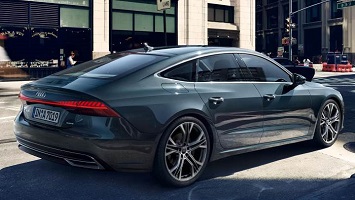Don’t want to your big exec car to look boring? Audi might have the answer with its latest A7, designed to take on the equally-new Mercedes CLS and even some spicy Italian contenders like the Maserati Quattroporte.
After our first drive in the top-spec 55 TFSI model in South Africa, we got our hands on a 50 TDI diesel in the UK. Read our full A7 review below.
Not boring? Audi’s new A7 is hardly a design revelation…
This is Audi, remember – their design evolution moves at an almost glacial pace. Still, you can happily argue the A7 is a handsome beast that comes with some important cues from 2014’s Prologue concept car. Did you not notice the wider grille? The pronounced swage lines? The tauter surfaces?
That and the LED lights – the front ones and the full-width rear light bar – come with their own beam boogie when you lock and unlock the car at night, just like the new A8, A6 and Q8.
Can’t wait to hear about the (yawn) interior…
Cut the snark, because here’s just one example where the A7’s A8 roots come into play. Where the old A7 got a fairly plain A6 interior this one feels much more upmarket – if not quite as special as Merc’s new CLS – and still offers plenty (in fact, more) room for four adults.
Audi A7 interior
Audi’s Virtual Cockpit digital instrument pack is standard and the latest MMI multimedia system ditches the familiar scroll wheel for a dual touchscreen setup: top screen for media, phone and nav; bottom one for climate and heated seats. It looks great and has haptic feedback, but the fact that it’s a touchscreen and almost all of the car’s controls are now housed within it means taking your eyes off the road more than before. We’ll miss you, MMI.
But with all this autonomous tech you mentioned, who needs to look at the road?
True, the A7 is one of the most advanced cars on the road in this respect. You can park it in a garage or bay from the outside, and actually drive completely hands-free in traffic at speeds of up to 37mph. Rival cars still require you to touch the wheel now and again. How old fashioned.
The sticking point is that UK law doesn’t currently allow you to use any of that tech, so it won’t be enabled from launch. Instead there’s a big blank button on the dashboard below the bottom infotainment screen where the letters ‘AI’ should be.
So which A7 to pick…
Well, first things first, you’ll need to grapple with Audi’s new naming structure: though still called the A7, and listing TDI or TFSI on the rump, the new car uses a two-digit number to denote the power output.
It’s not the specific output, though. The 3.0 TFSI petrol is a ‘55’, for example, because it has 335bhp. The 282bhp 3.0 TDI becomes ‘50’. The latest engines that Audi confirmed not long after the initial launch is the 40 TDI diesel (a 2.0-litre 4cyl diesel also seen in the new A6) and a 227bhp 3.0-litre diesel wearing a ’45 TDI’ badge.
Audi A7 rear detail
It’s not the specific output, though. The 3.0 TFSI petrol is a ‘55’, for example, because it has 335bhp. The 282bhp 3.0 TDI becomes ‘50’. Other engines, including four-pots and an RS7 will follow, but for now that’s your lot.
If someone else is buying the fuel or paying your company car tax, the petrol. It’s smooth and quiet, so much better at highlighting the A7’s incredible refinement than the diesel, and while it’s almost 90lb ft down on the TDI, it’s also 65kg lighter. That helps it get to 62mph in 5.3sec – 0.4sec quicker than its oil-burning alter-ego.
The 50 TDI diesel, meanwhile, is the most expensive engine you can buy in the UK by a few hundred quid. It’s a punchy unit, and one that is spread elsewhere in the VW Group range in cars like the Audi Q8 and VW Touareg. It’s a little gruff but the lazy torque means you don’t have to really push it all that much to get shifting up that dual carriageway pronto.
Both engines feature mild-hybrid electrical assistance systems that allow emissions-free coasting at speeds of up to 99mph. But they need them: this new A7 is actually fractionally heavier than the old one and even with the hybrid tech the 282bhp TDI’s 50mpg average is still some 5mpg worse than the 272bhp (but equally speedy) TDI it replaces.
The TFSi comes fitted with Audi’s new on-demand four-wheel drive system and operates in more efficient front-drive mode until you get excitable with the right pedal and the rear axle is pulled into play. The TDi, meanwhile, is too torquey for a dual-clutch ‘box so sticks with the eight-speed auto and permanent Quattro setup.
Audi A7 rear tracking
More metal means more messy understeer, right?
Not necessarily, at least not if you order the optional four-wheel steering system fitted to the test cars on the initial launch.
Unfortunately, stunning though the scenery was in Johannesburg, traffic around Chapman’s Peak moves so slowly it’d be out-dragged by a Notting Hill Carnival float, so there wasn’t much opportunity to really push the A7. Enough though, to suggest the four-wheel steering system will be worth splashing out on, and enough to know that you have to be trying pretty hard to broach the front tyres’ grip on the road. It’s not fun like a more expensive, more powerful BMW M5 or AMG E63, but it’s capable and controlled in that typically Audi way.
Audi A7 front tracking
Body control is good on the optional air suspension, at least in Dynamic mode, but the ride over sharp bumps is poor and shifting to Comfort to take the sting out of it adds too much heave without solving the problem. That’s on the mid-level 20in rim that comes with the S line trim. Our advice: go for Sport trim, stick with the standard 19s but spend on the air springs.
Audi A7: verdict
The A7 hopes to pummel its rivals into submission with a blend of elegant styling and next-generation technology. It’s an appealing proposition, particularly in uber-refined petrol form with the four-wheel steering, though the noisier diesel still makes more sense in the UK.
But don’t forget the autonomous features aren’t available yet, and Merc’s latest CLS coupe will be on the next boat from Germany.












